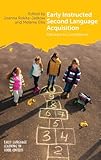Early Instructed Second Language Acquisition : Pathways to Competence / ed. by Joanna Rokita-Jaśkow, Melanie Ellis.
Material type: TextSeries: Early Language Learning in School ContextsPublisher: Bristol ; Blue Ridge Summit : Multilingual Matters, [2019]Copyright date: ©2019Description: 1 online resourceContent type:
TextSeries: Early Language Learning in School ContextsPublisher: Bristol ; Blue Ridge Summit : Multilingual Matters, [2019]Copyright date: ©2019Description: 1 online resourceContent type: - 9781788922500
- 9781788922517
- English language -- Study and teaching (Elementary) -- Foreign speakers
- Language and languages -- Study and teaching (Elementary) -- Foreign speakers
- Second language acquisition
- LANGUAGE ARTS & DISCIPLINES / Study & Teaching
- ELT
- Early instructed foreign language learning
- FL competence
- Negotiation of Meaning
- SLA
- TEYL pedagogy
- child foreign language learning
- early foreign language learning
- early foreign language teaching
- early language learning processes
- foreign language
- instruction
- language learning at pre-primary level
- language policy
- second language acquisition
- self-concept
- teaching a FL to young children with teaching a FL to young children with Special Educational needs
- the age factor
- young learners
- 3
- online - DeGruyter
| Item type | Current library | Call number | URL | Status | Notes | Barcode | |
|---|---|---|---|---|---|---|---|
 eBook
eBook
|
Biblioteca "Angelicum" Pont. Univ. S.Tommaso d'Aquino Nuvola online | online - DeGruyter (Browse shelf(Opens below)) | Online access | Not for loan (Accesso limitato) | Accesso per gli utenti autorizzati / Access for authorized users | (dgr)9781788922517 |
Frontmatter -- Contents -- Contributors -- Introduction -- Part 1: Early Language Learning in Compulsory Instruction -- Introduction -- 1. Policy and Practice in Early Foreign Language Learning: The Case of Poland -- 2. Integrating and Emulating: Early English Initiatives in Portugal -- Part 2: Pathways to Developing Early L2 Oracy and Literacy -- Introduction -- Forms and Functions of L2 Classroom Input -- 3. From Research on Child L2 Acquisition of English to Classroom Practice -- 4. Spotting the Differences between Child–Child and Child–Adult Interactions: Evidence from Spanish EFL Learners at Low Levels of Proficiency -- 5. The Role of Teacher Language in a Young Learner Classroom -- Pathways to Developing Early Literacy -- 6. Young EFL Learners and Their Reading Awareness: A Case Study with Twins -- 7. Effective Learning Interventions in Young Children: The Impact of Critical Reading Strategies -- 8. Extensive Reading in Primary EFL: Can Story Apps Do the Trick? -- Part 3: Pathways to Understanding Relationships in Early Foreign Language Learning and Teaching -- Introduction -- 9. Parental Perceptions of Bilingual Primary Schools in Poland: The (Added) Value of English -- 10. Parental Involvement in Very Early FL Education -- 11. Investigating the Self- Concept of Children with Special Educational Needs in the Context of Foreign Language Learning -- 12. Power Relationships in an Early Foreign Language Classroom -- Afterword -- Author Index -- Subject Index
restricted access online access with authorization star
http://purl.org/coar/access_right/c_16ec
This book provides a holistic overview of what leads to success in foreign language learning at an early age and deepens our understanding of early foreign language learning. The studies use an array of methodological approaches to research learners aged between three and ten, as well as their parents and teachers, in instructional, minimal-input settings. They describe various ways of organising and promoting very early foreign language learning, both through language policy and innovative pedagogy, and focus on ways of providing input for second language acquisition, which include oral classroom discourse strategies, as well as learner development of literacy skills. Special attention is given to the necessity to develop critical reading skills, the ability to handle multimodal texts, and attitudes, motivations and behaviours and how these may impact on the teaching and learning process. Chapters emphasise that ultimate outcomes depend on extra linguistic environmental factors, such as parental involvement and teacher competences. These include establishing control in the classroom, as well as using appropriate strategies for Negotiation of Meaning, and helping learners build positive self-concept. This book will be of interest to all professionals involved in the teaching of foreign languages to young learners, as well as to researchers, teacher educators and students working in this area.
Mode of access: Internet via World Wide Web.
In English.
Description based on online resource; title from PDF title page (publisher's Web site, viewed 25. Jun 2024)


